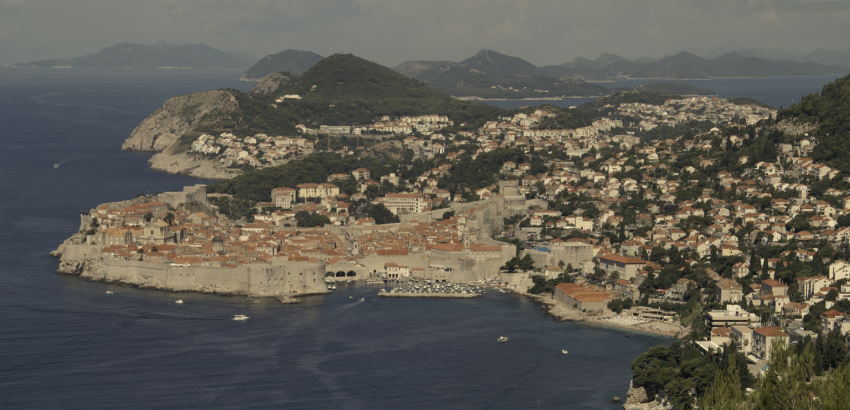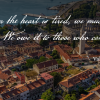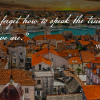
Published: January 24, 1998
View the Original Newsletter: Cirkular-4.pdf
About the Issue:
The fourth issue of Cirkular opens the year 1998 with a mix of reflection and resolve. Fresh from the reintegration of Eastern Slavonia, Croatia stands at the threshold of renewal — politically, socially, and spiritually. This issue blends messages of national unity, community updates from the Croatian diaspora in Toronto, and deeply personal editorials from Valentina Krčmar that highlight the strength of cultural identity in rebuilding after war.
A Message of Peace from President Franjo Tuđman
The issue begins with President Tuđman’s official Christmas and New Year message, written shortly after Croatia regained full sovereignty over its territory.
He expresses gratitude to all who contributed to Croatia’s freedom — soldiers, police, families, and the diaspora — and calls for peace and prosperity. His message celebrates the realization of the “centuries-old dream” of a free and democratic Croatian state, while encouraging unity and compassion in the years ahead.
Tuđman writes:
“We now face the task of building a homeland of progress and peace, founded on law, truth, and solidarity.”
This tone of hope sets the foundation for the issue’s larger theme: rebuilding not only the nation, but its moral and cultural fabric.
News from the Croatian-Canadian Community
Local coverage continues to play a vital role in connecting the diaspora to both their roots and their community in Toronto:
-
The Canadian-Croatian Congress of Toronto announces its annual meeting on March 29, 1998, to elect a new board and prepare for the national assembly in Oakville that spring.
-
A fundraising banquet is planned for February 6, 1998, at the Croatia Banquet Hall in Mississauga, with proceeds supporting Croatian-language programs at the University of Toronto.
-
The Croatian Students’ Association prepares for its formal winter dance at the end of January.
-
The Croatian Community Services organization promotes free computer literacy training and financial aid opportunities for adult learners — highlighting the growing integration of Croatian immigrants into Canadian society.
Even small notices — such as subscription requests and community announcements — carry an undercurrent of pride and persistence.
Remembering Stjepan Šen
One of the more personal moments in the issue is the obituary for Stjepan (Steve) Šen, a beloved volunteer and long-time member of Toronto’s Croatian community.
Valentina Krčmar’s tribute remembers him as a man of boundless energy and kindness, who supported Croatian institutions and individuals alike. She closes with a simple farewell:
“As a true Croat, may he rest in peace in his homeland.”
Letters to the Editor
The newsletter features touching correspondence from readers — including a note from the family of founder Zvonimir Mekinda, written from Zagreb, expressing joy that Cirkular continues his legacy.
Another letter from a Toronto reader offers praise and encouragement: “You are getting better; I like it more every time.”
Krčmar responds with humility, reflecting on the hard work required to continue publishing Cirkular after Mekinda’s passing and expressing deep respect for his dedication to community journalism.
Political and Humanitarian Updates from Croatia
The HINA news section provides a window into Croatia’s international and domestic affairs at the start of 1998:
-
The peaceful transfer of power in the Danube region proceeds smoothly, with OSCE officials reporting “cautious optimism.”
-
Refugee return and resettlement efforts continue, though challenges remain with housing and property restitution.
-
Reports note that Serbian families are slowly leaving Eastern Slavonia after the UN mission ended, though in smaller numbers than predicted.
-
Croatia’s government continues to strengthen diplomatic ties with nations such as Turkey and Germany, emphasizing economic cooperation and stability.
-
The World Bank approves new reconstruction credits for Bosnia-Herzegovina, marking growing international confidence in the region’s postwar recovery.
The issue also reports on ongoing trials at The Hague, including that of former Vukovar mayor Slavko Dokmanović, as witnesses testify to his role in the persecution of Croats during the war.
Cultural Corner: The Music of Our Community
In her editorial “Glazba je važan dio mog života” (“Music Is an Important Part of My Life”), Krčmar reflects on attending a New Year’s Eve celebration at the Croatia Club in Toronto, where the Croatian band Dečki z bregov performed.
While she praises their energy and authenticity, she also calls attention to the untapped local musical talent within Toronto’s Croatian community — musicians who volunteered during the war and now deserve recognition and support.
She challenges event organizers to feature these local artists more often, adding a pointed note about respect for Croatia’s national anthem:
“The anthem should be played with dignity — not as a stage experiment.”
Literature and Heritage: “The Ten Theses on the Croatian Language”
Continuing from previous issues, this installment features the “Ten Theses on the Croatian Language”, originally published by Matica Hrvatska, explaining the roots and evolution of the Croatian standard language.
It explores the deep connection between linguistic identity and national culture, tracing the development of Croatian from glagolitic texts to modern literature — a timely reminder of how language itself has been a vessel of survival through centuries of foreign rule and war.
Voices from the Homeland and Beyond
The issue closes with selections from HINA and international reports, covering a wide range of stories:
-
Ivana Trump’s investment in the Croatian newspaper Slobodna Dalmacija;
-
The INA oil company’s reopening of rigs in the Danube region;
-
Discovery of a mass grave in Tovarnik;
-
Growing tensions in Kosovo; and
-
U.S. troops arresting the self-proclaimed “Serb Adolf,” a war criminal in Bosnia.
These reports remind readers that even as Croatia celebrates peace, the region remains haunted by the lingering effects of war and justice still unfolding.
Final Reflections by Valentina Krčmar
In her closing note, Krčmar’s tone is both personal and contemplative. She recalls the late Mr. Mekinda’s perseverance, acknowledges the challenges of editing Cirkular, and reaffirms her belief in the power of community-driven journalism.
Her voice is steady and sincere — an example of the quiet strength that kept the Croatian-Canadian community connected during a time of transformation and healing.
In Summary
Cirkular No. 4 captures a moment of transition — from war to peace, loss to renewal, and from dependence to self-determination.
Through presidential messages, diaspora news, heartfelt letters, and cultural reflections, the issue celebrates both national pride and human compassion. It’s a record of how Croatians, at home and abroad, continued to rebuild not just their country, but their shared sense of belonging.




